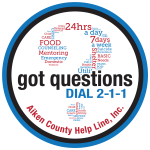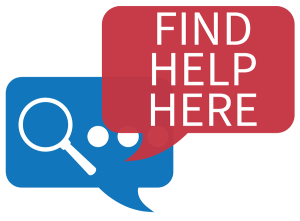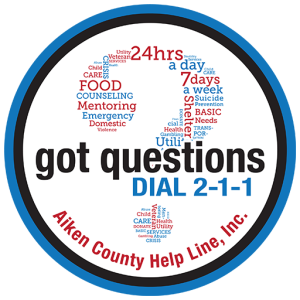AIKEN 2-1-1 HISTORY
The Aiken County Help Line/2-1-1 began operation as The Aiken County Crisis Line on December 1, 1977, and took just over 600 calls during the first year. In October 1978, the Aiken County Crisis Line petitioned for incorporation as a 501(c) (3) nonprofit organization. On November 10, 1978, it received its amended state charter as the Aiken County Help Line, Inc.
By 1980, 1,415 calls were taken, and the operation moved from the Aiken Center for Alcohol and Other Drug Services to space provided by Aiken County. In 1989 the first Teen Line was introduced, and by 1992 approximately 2,400 calls were taken.
In 1995, Help Line held its first Board Retreat. The Help Line received its first two grants in 1997. One was from the Sisters of Charity (SOC) to establish Help Line House to assist welfare-to-work clients (this program was handed off to Goodwill when they arrived in Aiken to preclude redundant programs), and the Victims of Crime Act (VOCA) Grant to fund a full-time program coordinator.
Call volume for the Help Line had built to 3,681, including contracts to serve as the 24/7 emergency number for several community agencies. In 2000 an SOC grant provided start-up funding for the Community Voice Mail program, and in 2002 a Substance Abuse and Mental Health Services Administration (SAMHSA) grant enabled the Help Line to re-establish the TEEN LINE/YOUTH CENTRAL. This program remained at the Help Line until 2006.
In June 2002, we launched as the second 2-1-1 call center in South Carolina. Call volume increased from just over 5,000 in 2001 to over 6,900 in 2002.
In January 2005, the Graniteville train wreck and chlorine release occurred. During the 16-day response, Help Line/2-1-1 took 2,811 calls directly relating to the disaster and the normal call volume. At the end of 2005, call volume approached 11,000.
Realizing the importance and role of the Help Line during a community crisis/disaster, the 2006 class for Leadership Aiken County nominated the Aiken County Help Line Inc. as its class project. Recognizing the Help Line’s need for stable, reliable, and ongoing funding, Leadership class members submitted a request for funding from Aiken County Government. Funding was received and has been each year since. Aiken County Governments’ contribution to the Aiken County Help Line, Inc. displays the value placed on its citizens’ needs. In 2008, Aiken County Help Line 2-1-1 began a collaboration with the City of Aiken to offer non-emergency support to the city’s 9-1-1 service. This allows the 911 number to be utilized for true emergencies only and reduces the number of inappropriate calls to the 9-1-1 system.
The Trident (Charleston) 2-1-1 Call Center, unfortunately, closed in 2015, and the Columbia 2-1-1 Call Center closed in December of 2019. This left Aiken 2-1-1 as the only 2-1-1 Call Center in the state. Our statewide database includes nearly 4,500 listings of agencies, services, and resources to assist callers in need via phone, chat, and limited text. We fielded over 102,000 calls in 2022 statewide.
In January 2011, the Aiken County Help Line 2-1-1 received AIRS Accreditation (Alliance of Information & Referral Systems). We were reaccredited in 2015 and again, most recently in December 2022. All staff that are eligible to be AIRS Certified are, and those not able yet are working toward it. Staff are also trained in ASIST (Applied Suicide Intervention Skills Training), a 15-hour hands-on suicide intervention program offered by Livingworks (National Suicide Prevention Hotline, now 9-8-8), are HIPAA compliant, and are trained in a number of different areas, including disaster.
We have the capacity to share phone technology to work as a seamless transition between Call Centers, should the need arise. If an emergency occurs in Aiken and we need additional phone support, we can transfer calls to other 2-1-1 Call Centers nationwide if they agree to help. This allows us the ability to ramp up if the need were to arise. And since our phone and database systems are web-based, our agents can pick up and move at a moment’s notice. In the event a disaster strikes, we would be based at our Aiken County Emergency Operations Center (EOC).



